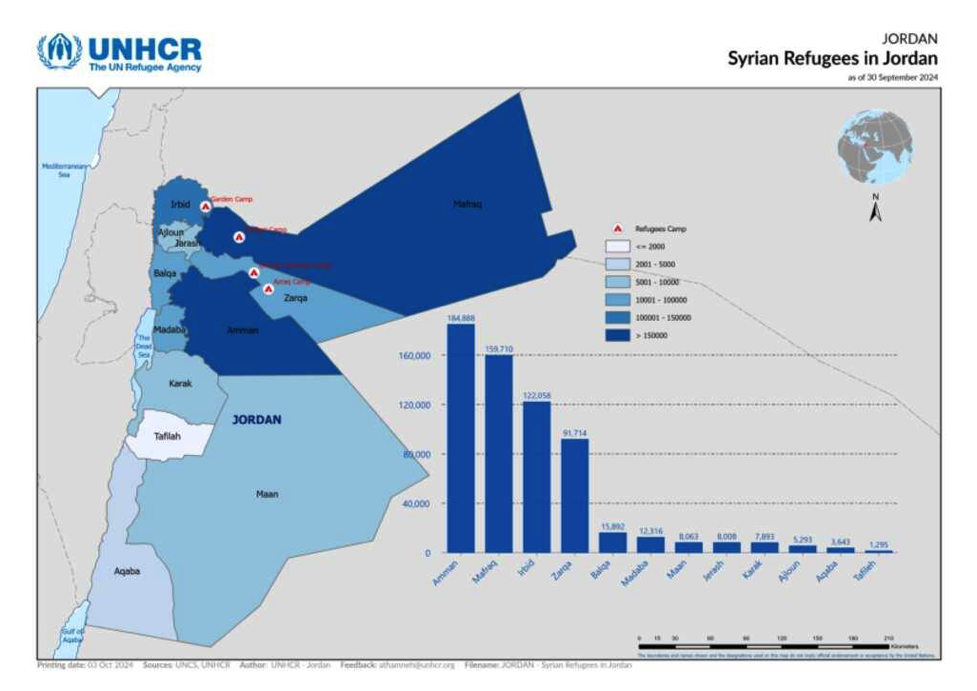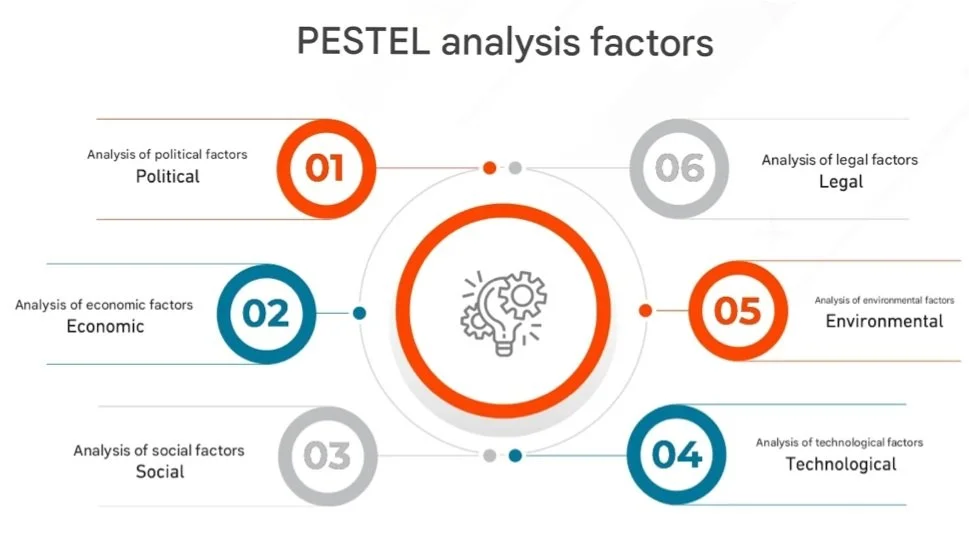Rethinking the Future of Syrian Refugees in Jordan: Challenges, Support, and Strategic Choices
Syrian Refugees in Jordan - 30 September 2024. Source: UNCHR , Google Image : https://data.unhcr.org/en/documents/details/111581.
by: Amani Jarrar - Philadelphia University | Rasha Istaiteyeh - Hashemite University
Introduction
Jordan, throughout its modern history, has dealt with large waves of refugees, making it one of the countries hosting the highest percentage of refugees relative to its population. The kingdom hosts around 1.3 million Syrian citizens, including more than 671,000 registered refugees with the United Nations. Only about 10% of these refugees live in refugee camps, while the rest are spread across local communities, leading to increasing negative repercussions amid the ongoing Syrian crisis. Jordan, under its Hashemite leadership, provided assistance to refugees based on deep-rooted humanitarian, moral, and national values. However, the kingdom emphasizes the necessity for the international community to play its role in addressing this unprecedented humanitarian crisis.
Jordan has faced significant challenges since the onset of the Syrian crisis in 2011, with its economy and social services under strain from the influx of refugees. As of 2024, nearly 3.5 billion euros in aid from the European Union has been directed toward Jordan, aiming to address immediate humanitarian needs and long-term developmental goals. Despite this support, Jordan is confronted with increasing pressure as the refugee population grows, and the international community’s commitment wanes.
The future of Syrian refugees in Jordan has become a pressing concern, and while the official stance of Jordan, as expressed by King Abdullah II in 2023, stresses that the country cannot accommodate further refugees and that their return to Syria is essential, the reality of that return remains uncertain. Most refugees, with 97% expressing no intention to return, present a key obstacle to Jordan's policy goals. The complexities of this situation go beyond a simple refugee return and require an examination of the broader governance framework, the European Union's role, and the evolving dynamics within the region.
Key Issues in Managing the Syrian Refugee Crisis
One of the central difficulties faced by the Jordanian government is reconciling the conflicting figures on the refugee population, with discrepancies between government estimates and those from the United Nations. Additionally, Jordan’s limited resources have been further strained by a significant decrease in international funding, which was only 29.2% of the required amount in 2023. This shortfall, alongside the difficulty in securing refugee returns, creates a challenging landscape for decision-makers. Jordan's governance approach, encapsulated in its 1998 memorandum with the United Nations High Commissioner for Refugees, places responsibility for refugee management squarely within international frameworks. However, as the refugee population persists, there are mounting questions over whether these frameworks are sufficient to address the complex and evolving needs. King Abdullah II’s statement that Jordan cannot continue hosting refugees indefinitely underscores the growing frustration with an ongoing crisis that has not only strained public services but also hindered economic recovery, especially after the added burdens of the COVID-19 pandemic.
The Role of European Support in Shaping Jordan's Approach
The European Union’s continued aid remains a cornerstone of Jordan’s efforts, but it is also clear that this external support is increasingly tied to the geopolitical and regional context. In 2024, the EU allocated 14 million euros to support refugee health, education, and protection, yet the EU’s aid cannot fully mitigate the economic and social costs imposed on Jordanian society. With international funding shrinking, it is evident that a more comprehensive and sustainable solution must be found. This includes not only considering the return of refugees but also developing mechanisms for their reintegration within Syria and ensuring that the region remains stable enough to facilitate these returns.
Shaping Strategic Decisions: The Need for a Comprehensive Framework
What is clear from this analysis is that Jordan’s decision-making on the refugee issue must be informed by a more cohesive and nuanced strategy, integrating political, economic, social, technological, environmental, and legal considerations. The PESTEL framework, often used in policy analysis, provides a structured approach to understanding these dimensions. While it is uncertain if the Jordanian government explicitly uses PESTEL in its current decision-making, it is clear that these factors are central to any effective resolution.
A strategic shift is needed, one that includes not just immediate humanitarian support but also long-term planning for the reintegration of refugees into Syria, as well as strengthening Jordan’s own resilience. This will require closer coordination with international partners, including the EU, and a more significant investment in Jordan's infrastructure, labor market, and social services to accommodate both refugees and Jordanian citizens.
Figure 1: PESTEL analysis methodology for managing the refugee file
PESTEL: P: Political; E: Economic; S: Social; T: Technological; E: Environmental; L: Legal Source: Corporate Finance Institute. PESTEL analysis – Understanding external factors affecting business. Retrieved from: https://corporatefinanceinstitute.com/resources/management/pestel-analysis
For the purpose of this analysis the PESTEL methodology was applied to assess the political, economic, social, technological, environmental, and legal dimensions of the Syrian refugee issue in Jordan. This analysis provides a structured approach to understanding the multidimensional impact of Syrian refugees in Jordan, which can support strategic planning and policymaking. The following Figure 1 illustrates the PESTEL methodology data. The PESTEL analysis for managing the Syrian refugee file in Jordan also requires studying the external factors that affect this file, as Jordan is one of the largest host countries for Syrian refugees. Over the past years, the Kingdom has faced multiple challenges in dealing with this crisis. The following is a PESTEL analysis in the context of managing the Syrian refugee issue in Jordan:
Political factors: Jordanian policy towards refugees: The Jordanian government follows a relatively open policy towards Syrian refugees but within the limits of its absorption capacity. This includes providing humanitarian assistance and coordinating with international organizations, but there are political pressures to reduce the Syrian refugees number in Jordan due to internal challenges.
Economic factors: The Syrian crisis has significantly impacted the Jordanian economy, as the influx of refugees has increased pressure on public services, such as education and healthcare. The strain on infrastructure has also risen, leading to higher costs. Jordan also relies on financial support from international entities such as the World Bank, the European Union, and the United Nations. This support helps provide basic services to refugees but may be insufficient given the increasing numbers.
Social factors: Syrian refugees face challenges in integrating into Jordanian society due to cultural and linguistic differences. There is also social resistance from some local communities towards them due to concerns about social and economic pressures. The number of students in Jordanian schools has doubled, increasing the pressure on the educational system. Additionally, the availability of healthcare for refugees poses a significant challenge as they suffer from a lack of basic health services.
Technological factors: Technology can be used to improve the management of refugee data, including the registration of refugees and the provision of services. For example, some international organizations offer electronic tracking programs for financial or food assistance.
Environmental factors: The presence of large numbers of refugees in Jordan puts pressure on natural resources such as water and energy. For example, the demand for water and energy increases in the camps and communities hosting the refugees.
Legal factors: Jordan is committed to several international agreements related to refugees, such as the 1951 Geneva Convention, but it faces challenges in implementing these treaties due to limited resources. There are also challenges in providing the rights of Syrian refugees according to international standards.
Recommendations for the governance of the Syrian refugees' return file
1. Supporting a peaceful political transition in Syria: Jordan must support the political transition process in Syria to ensure the safe return of refugees.
2. Restoring diplomatic relations with Syria: Diplomatic relations with the upcoming Syrian government must be strengthened to ensure the voluntary and safe return of refugees.
3. Providing basic services: Educational and health services for refugees must continue until their safe return is ensured.
4. Strengthen Coordination with International Partners: Jordan should collaborate closely with the EU, UN, and neighboring countries to ensure a unified approach to the refugee return process.
Conclusion
The Syrian refugee crisis in Jordan requires a comprehensive, long-term strategy that goes beyond short-term humanitarian aid. While European Union support has been crucial, the growing refugee population and diminishing international funding create significant challenges for Jordan. The government's position on refugee return, while critical, is complicated by the realities of political, social, and economic factors. To effectively address the crisis, Jordan must focus on strengthening governance, improving infrastructure, and working closely with international partners to develop sustainable solutions, including the reintegration of refugees in Syria. Only through a holistic approach can Jordan manage the refugee issue while ensuring the well-being of both its citizens and the refugees it hosts.
Contact:
Rasha Istaiteyeh, Hashemite University, Jordan | ristaiteyeh@hu.edu.jo
Amani Jarrar, Philadelphia University, Jordan | Aj8infinity@gmail.com


